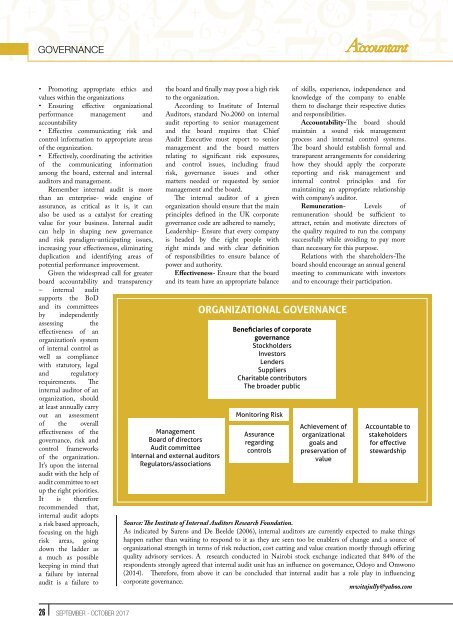The-Accountant-Sep-Oct-2017-Final
Create successful ePaper yourself
Turn your PDF publications into a flip-book with our unique Google optimized e-Paper software.
Governance<br />
• Promoting appropriate ethics and<br />
values within the organizations<br />
• Ensuring effective organizational<br />
performance management and<br />
accountability<br />
• Effective communicating risk and<br />
control information to appropriate areas<br />
of the organization.<br />
• Effectively, coordinating the activities<br />
of the communicating information<br />
among the board, external and internal<br />
auditors and management.<br />
Remember internal audit is more<br />
than an enterprise- wide engine of<br />
assurance, as critical as it is, it can<br />
also be used as a catalyst for creating<br />
value for your business. Internal audit<br />
can help in shaping new governance<br />
and risk paradigm-anticipating issues,<br />
increasing your effectiveness, eliminating<br />
duplication and identifying areas of<br />
potential performance improvement.<br />
Given the widespread call for greater<br />
board accountability and transparency<br />
– internal audit<br />
supports the BoD<br />
and its committees<br />
by independently<br />
assessing the<br />
effectiveness of an<br />
organization’s system<br />
of internal control as<br />
well as compliance<br />
with statutory, legal<br />
and regulatory<br />
requirements. <strong>The</strong><br />
internal auditor of an<br />
organization, should<br />
at least annually carry<br />
out an assessment<br />
of the overall<br />
effectiveness of the<br />
governance, risk and<br />
control frameworks<br />
of the organization.<br />
It’s upon the internal<br />
audit with the help of<br />
audit committee to set<br />
up the right priorities.<br />
It is therefore<br />
recommended that,<br />
internal audit adopts<br />
a risk based approach,<br />
focusing on the high<br />
risk areas, going<br />
down the ladder as<br />
a much as possible<br />
keeping in mind that<br />
a failure by internal<br />
audit is a failure to<br />
the board and finally may pose a high risk<br />
to the organization.<br />
According to Institute of Internal<br />
Auditors, standard No.2060 on internal<br />
audit reporting to senior management<br />
and the board requires that Chief<br />
Audit Executive must report to senior<br />
management and the board matters<br />
relating to significant risk exposures,<br />
and control issues, including fraud<br />
risk, governance issues and other<br />
matters needed or requested by senior<br />
management and the board.<br />
<strong>The</strong> internal auditor of a given<br />
organization should ensure that the main<br />
principles defined in the UK corporate<br />
governance code are adhered to namely;<br />
Leadership- Ensure that every company<br />
is headed by the right people with<br />
right minds and with clear definition<br />
of responsibilities to ensure balance of<br />
power and authority.<br />
Effectiveness- Ensure that the board<br />
and its team have an appropriate balance<br />
Management<br />
Board of directors<br />
Audit committee<br />
Internal and external auditors<br />
Regulators/associations<br />
ORGANIZATIONAL GOVERNANCE<br />
Beneficiaries of corporate<br />
governance<br />
Stockholders<br />
Investors<br />
Lenders<br />
Suppliers<br />
Charitable contributors<br />
<strong>The</strong> broader public<br />
Monitoring Risk<br />
Assurance<br />
regarding<br />
controls<br />
of skills, experience, independence and<br />
knowledge of the company to enable<br />
them to discharge their respective duties<br />
and responsibilities.<br />
Accountability-<strong>The</strong> board should<br />
maintain a sound risk management<br />
process and internal control systems.<br />
<strong>The</strong> board should establish formal and<br />
transparent arrangements for considering<br />
how they should apply the corporate<br />
reporting and risk management and<br />
internal control principles and for<br />
maintaining an appropriate relationship<br />
with company’s auditor.<br />
Remuneration- Levels of<br />
remuneration should be sufficient to<br />
attract, retain and motivate directors of<br />
the quality required to run the company<br />
successfully while avoiding to pay more<br />
than necessary for this purpose.<br />
Relations with the shareholders-<strong>The</strong><br />
board should encourage an annual general<br />
meeting to communicate with investors<br />
and to encourage their participation.<br />
Achievement of<br />
organizational<br />
goals and<br />
preservation of<br />
value<br />
Accountable to<br />
stakeholders<br />
for effective<br />
stewardship<br />
Source: <strong>The</strong> Institute of Internal Auditors Research Foundation.<br />
As indicated by Sarens and De Beelde (2006), internal auditors are currently expected to make things<br />
happen rather than waiting to respond to it as they are seen too be enablers of change and a source of<br />
organizational strength in terms of risk reduction, cost cutting and value creation mostly through offering<br />
quality advisory services. A research conducted in Nairobi stock exchange indicated that 84% of the<br />
respondents strongly agreed that internal audit unit has an influence on governance, Odoyo and Omwono<br />
(2014). <strong>The</strong>refore, from above it can be concluded that internal audit has a role play in influencing<br />
corporate governance.<br />
mwitajully@yahoo.com<br />
26 september - october <strong>2017</strong>

















